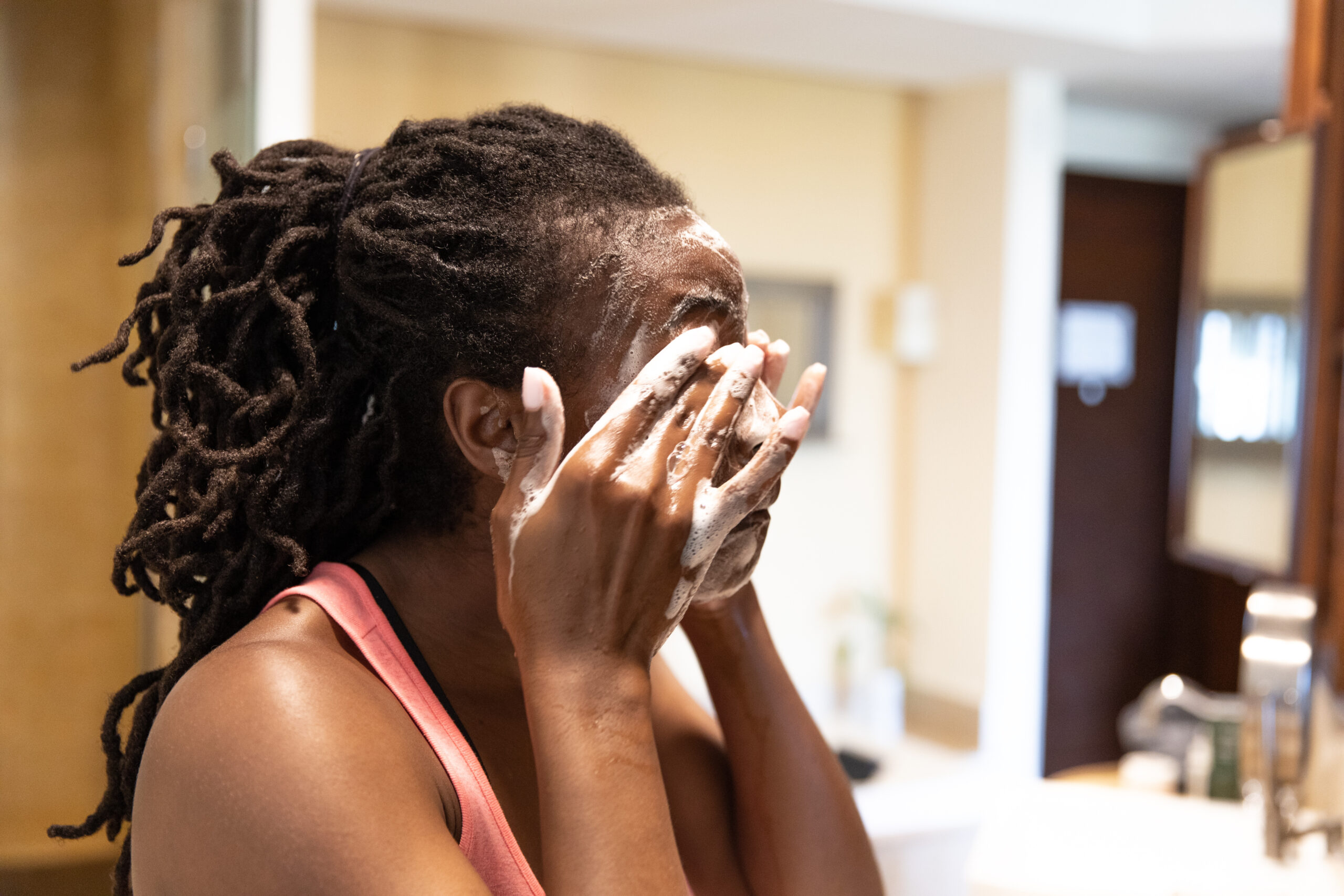Some beauty hacks you catch online may seem a little unorthodox. One such hack circulating the social-sphere is the use of Head & Shoulders anti-dandruff shampoo to clear up fungal acne. This popular anti-dandruff shampoo is typically used for scalp care. Now it’s also being touted as a surprising solution for breakouts caused by fungal overgrowth. While it may sound unconventional, some beauty influencers swear by it.
The Skincare Hack That Went Viral
The conversation began when influencer, Darcei, shared her personal experience of clearing up her fungal acne using Head & Shoulders. Her skin had been a battleground for acne breakouts, and after using countless acne treatments, she stumbled upon an unexpected solution. The shampoo’s active ingredient, zinc pyrithione, known for its antifungal properties, helped reduce her breakouts. This prompted a flood of interest and curiosity from others looking for a solution to their stubborn skin issues.
But before you rush to your shower and lather your face with shampoo, it’s important to understand what fungal acne really is and why a shampoo might actually help in some cases.
Fungal Acne vs. Traditional Acne: What’s the Difference?
Dr. Hannah Kopelman, a board-certified dermatologist, broke down the distinction between fungal acne and traditional acne, highlighting the different causes and treatments.
“Fungal acne, scientifically known as Malassezia or pityrosporum folliculitis, is quite different from traditional acne,” she explained. “Traditional acne is primarily caused by bacteria, specifically Propionibacterium acnes, and is influenced by factors like hormonal changes and excess sebum. Fungal acne, on the other hand, results from an overgrowth of Malassezia yeast, which naturally lives on our skin.”
Kopelman says when these yeasts multiply excessively—often due to conditions like humidity or oiliness—they cause inflammation, leading to small, uniform, itchy pustules. Unlike traditional acne, which responds well to antibacterial agents and retinoids, fungal acne requires antifungal treatments.
Dandruff Shampoo for Acne: Fact or Fiction?
Kopelman does validate the idea that Head & Shoulders could work for some people struggling with fungal acne.
“There is some truth to these reports. Head & Shoulders contains zinc pyrithione, which is both an antifungal and antibacterial agent. It works by reducing the population of Malassezia yeast on the skin,” she said.
This means that for those dealing with fungal acne, applying the shampoo to affected areas could result in clearer skin as the yeast growth is controlled.
However, as with any treatment, what works for one person may not work for another. While many people have shared their positive experiences online, the science behind using anti-dandruff shampoo on the face is still limited to anecdotal evidence.
“The use of zinc pyrithione on the face is mostly anecdotal rather than backed by extensive studies,” Kopelman explained.
Still, dermatologists sometimes recommend using anti-dandruff shampoos like Head & Shoulders off-label to treat fungal acne, based on clinical experiences.
Dr. Mary Alice Mina, another respected dermatologist, also emphasized the potential effectiveness of the shampoo.
“Pyrithione zinc, which is well-documented in treating dandruff and seborrheic dermatitis—both conditions triggered by Malassezia yeast—can be useful for fungal acne,” she explained.
The Risks of Dandruff Shampoo for Acne
While Head & Shoulders may help clear up fungal acne, it’s not without its risks. For women with darker skin tones, its best to be cautious. Both Kopelman and Mina caution that using it could lead to irritation and even hyperpigmentation.
“Any form of irritation or inflammation, especially in patients with darker skin tones, can lead to post-inflammatory hyperpigmentation (PIH),” Dr. Kopelman noted.
This is why dermatologists stress the importance of caution when using Head & Shoulders on your face. Patch testing is highly recommended, along with starting with a diluted version of the shampoo to minimize potential irritation.
Mina adds that taking proactive steps, such as using a hydrating moisturizer and daily sunscreen, can help mitigate these risks.
“Be sure to use a gentle, hydrating moisturizer to counteract potential dryness and a sunscreen daily to prevent hyperpigmentation,” she advised.
Proceed With Caution
Trying Head & Shoulders as part of your skincare routine depends on your skin type and needs. If you suspect you have fungal acne, the antifungal properties of Head & Shoulders might work for you. However, it’s crucial to proceed with caution.
“If you notice any signs of irritation—such as redness, dryness, or itching—it’s best to discontinue use immediately and consult with a dermatologist,” Kopleman advised.
For those with darker skin tones, the potential for hyperpigmentation makes it even more important to approach this treatment carefully. Mina emphasized that if you develop redness, itching, or a rash, stop using Head & Shoulders.
